Can IUI Really Let You Pick Your Baby’s Gender?
Fertility Treatment
One of the advantages of using Assisted Reproductive Technology (ART) such as IUI and IVF is the ability to determine the sex of the fetus at the beginning of pregnancy and even before implantation. In natural conception, the gender of the fetus is determined at the end of the first trimester of pregnancy using ultrasound, while in IUI or IVF methods, the fetus's gender is accurately determined in the initial days of conception.
When considering gender selection with IUI, it is important to be aware of the success rates associated with this procedure. The success rate can vary depending on various factors, including the age and health of the individuals involved and the specific techniques used during the procedure. By exploring the potential success rates and limitations of IUI gender selection, couples can better assess their options and make choices that align with their family planning goals, including considerations of IUI baby gender rates.

What Is the IUI Gender Selection Procedure?
IUI (Intrauterine Insemination) gender selection procedure, also known as sperm sorting or gender selection through artificial insemination, is a technique used to increase the chances of conceiving a child of a specific gender. The procedure involves separating the sperm cells into two samples based on their DNA, either X or Y chromosomes.
Before the IUI procedure, the female partner usually undergoes hormonal stimulation to enhance the growth and maturation of the eggs. Once the eggs are mature, they are monitored through ultrasounds and hormonal blood tests. The male partner's semen sample is collected and then processed using a technique called sperm sorting, which separates the sperm cells based on their gender.
The sorted sperm sample of the desired gender (X or Y chromosome) is then inserted into the female partner's uterus using a thin catheter guided through the cervix. This procedure aims to bring the sperm closer to the egg, increasing the chances of fertilization.
Gender selection in IUI allows couples to choose gender in IUI, providing them with greater control over their family planning, although it is not 100% guaranteed. It is important to note that the procedure is not considered a medically necessary treatment and is usually performed for personal or family balancing reasons. Couples opting for this procedure often seek assurance regarding IUI babies' gender and specifically pursue IUI treatment for baby boy preferences.
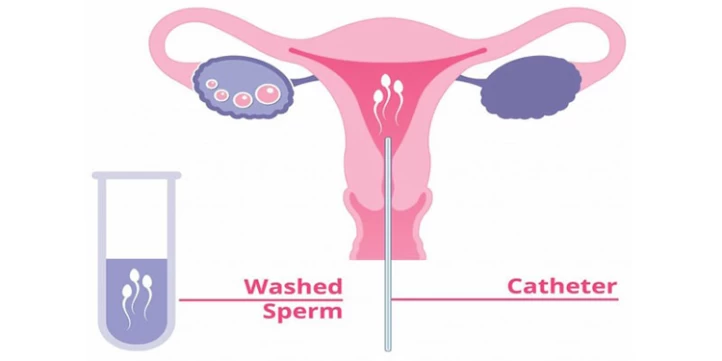
Which Gender Selection Method Is Feasible?
There are a variety of ART techniques for gender selection, the most common of which is IVF treatment and the PGD test. The PGD (pre-implantation genetic diagnosis) method can be used during the IVF process at the same time as the embryo development in the laboratory, which has undergone several cell divisions.
The IUI procedure cannot identify the sex of the fetus as precisely as IVF. The sex of the baby can be anticipated to some extent during IUI by distinguishing male and female sperms based on their movement or weight. According to the situations discussed, the best approach to detect the baby's gender differs for each couple. The medical specialist introduces and employs the optimal procedure based on the couple's fertility status or type of infertility, their purpose of gender selection, the number of current children, and their financial state.
If IVF is required due to severe infertility issues and the parents insist on a specific gender, IVF treatment is considered the best option. However, if the IUI method can be used to get impregnated and the parents decide on a preferred sex for their child, the IUI procedure will be a better option.
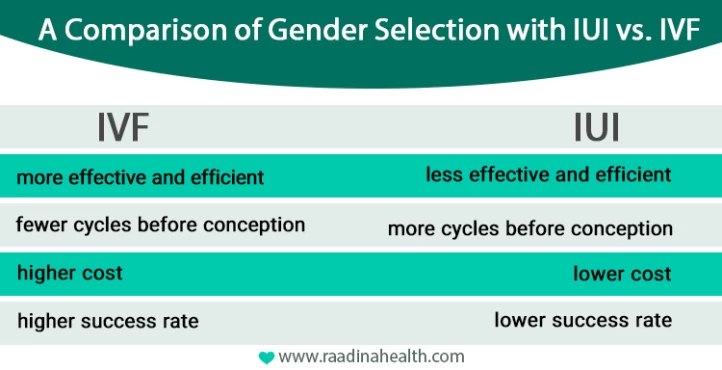
Preparations Before IUI Gender Selection
Gender determination requires planning to succeed. Because sperms tend to develop in 72 hours, it is better to select a diet that improves the quality of the produced sperms three days before the procedure. Natural zinc and minerals found in foods like pumpkin seeds, beef, eggs, nuts, and oats can substantially impact sperm quality.
Partners have to follow several rules for having sex before the IUI operation. For example, if a sperm disorder does not cause infertility, couples can have sex up to 24 hours before the procedure. If the operation is being performed due to a sperm disorder (low number or quality), young couples should abstain from sexual intercourse for at least 48 hours before IUI for gender selection.
The night before the procedure, women should take a bath, and it's best if they don't wear makeup before they visit the treatment center. Eating a heavy meal the night before the procedure should be avoided. Thin soup is an excellent choice for female patients. Consuming any food or drink (even water) is prohibited after midnight.
How Does the IUI Procedure Determine Gender?
The male sperm sample is examined in the laboratory to determine the gender using the IUI method because the sex of the baby is decided based on the sperm chromosomes. During an IUI procedure, a semen sample is collected from the male partner, and the higher-quality sperm are separated and washed.
Following that, the sperm should be divided into groups based on their probable sex, taking into account their speed and motility. The female sperm with the X chromosome travels more slowly than the male sperm with the Y chromosome.
The sperms with the desired gender are injected into the woman's uterus after being divided into two groups based on their motility. Given that sperm have XY chromosomes and eggs (female sex cells) only have XX chromosomes, the fetus has a 50% chance of being either a boy or a girl.
The semen is subsequently washed using specific techniques, and then the washed sperm is injected into the woman's uterus using a catheter. Women should use ovarian stimulation medications to enhance the number of eggs released throughout each cycle. IUI gender selection is an outpatient procedure that does not call for hospitalization.
When considering IUI for conceiving a boy, couples often inquire about IUI baby boy chances and IUI baby gender rates. They seek specialized IUI treatment for baby boy preferences, aiming to increase the likelihood of having a male child through the selection process.

Possibility of Twin Pregnancy in IUI
Compared to techniques like IVF, the likelihood of having twins or multiples with the IUI procedure is substantially lower regardless of the gender of the fetus. Due to proper ovarian stimulation and the option to select the desired number of embryos to be transferred to the woman's uterus, the IVF process offers a chance to grow more than one embryo.
In contrast, in the IUI method, the level of ovarian stimulation is lower, and sperms are injected into the uterus directly without fertilization. Hence, the embryo formation occurs inside the uterus. It is, therefore, impossible to anticipate how many fertilizations will occur inside the uterus, just like with a natural pregnancy. According to statistics, there is a 3% maximum possibility of conceiving twins through the IUI procedure.
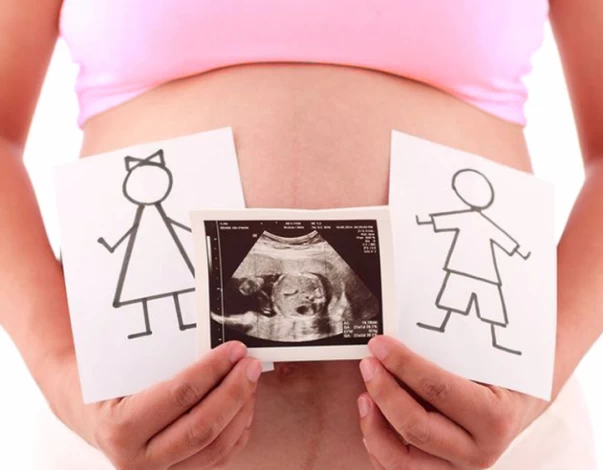
IUI Gender Selection Pros & Cons
Advantages of IUI for Gender Selection
The most significant advantages of gender selection by IUI are its ease of execution, rapid progress, low cost, outpatient treatment process, and the possibility of repeating it numerous times (if pregnancy does not occur). Couples must investigate and ask about the most qualified specialists and the most successful clinics in this field as IUI does not always provide 100% accuracy in gender selection.
IUI Gender Selection Disadvantages
Like any other treatment approach, IUI pregnancy and sex selection may have risks and complications. As mentioned earlier, IUI is often performed with drugs like ovarian stimulants, which, although not necessary, significantly increases the likelihood of the treatment being successful.
A high dose of these medicines can cause disorders such as ovarian hyperstimulation syndrome in certain persons. During this condition, the enlargement of the ovaries causes considerable discomfort, and the accumulation of fluids leads to bloating and abdominal enlargement.
What Is the Success Rate of Sex Selection with the IUI Method?
The female patient's age affects the success rate of the IUI Gender Selection procedure. IUI gender selection success rate is 10-20% in women under 35 years old and roughly 2-5% over 40 years old. The reason for performing IUI can also impact its success rate.
If the couple does not have fertility problems, IUI for gender selection has a success rate of 7-10% per menstrual cycle. This likelihood rises to 15-25% if pregnancy drugs are used. Statistically speaking, most women become pregnant on their first try, but it takes two to three IUIs on average to become pregnant.
How Much Does the IUI Procedure for Gender Selection Cost?
IUI with gender selection cost is determined by factors such as the clinic where the procedure is administered, the equipment and facilities utilized, the doctor's expertise and experience, the couple's fertility status, and their expectations from the treatment. Although the final price of gender selection with IUI is decided by the Ministry of Health and Medical Education, due to their fluctuation, it is best to ask the clinic for the final fee before starting with the treatment.

Final Word
IUI Gender Selection is a simple, low-risk procedure with adequate accuracy that has piqued the interest of many couples. This procedure reduces the risk of genetic diseases and maintains family harmony by helping select the preferred gender of the fetus. Couples should visit clinics with a high success rate and qualified and experienced specialists to maximize the chances of success of using the IUI gender selection method.
FAQ on Sex Selection with IUI
Is sex selection with IUI legal in all countries?
The legality of sex selection with IUI varies by country and jurisdiction. Some countries have strict regulations or bans on sex selection for non-medical reasons. Researching the laws in your area before pursuing this option is important.
Are there any age restrictions for undergoing sex selection with IUI?
Age restrictions for sex selection with IUI may vary depending on the clinic or healthcare provider. Generally, individuals undergoing fertility treatments, including sex selection with IUI, should be of reproductive age and in good overall health.
How many cycles of sex selection with IUI may be needed to achieve the desired sex?
The number of cycles needed to achieve the desired sex through sex selection with IUI can vary depending on individual factors such as age, fertility status, and sperm quality. Some individuals may succeed in one cycle, while others may require multiple cycles.
Is sex selection with IUI a safe procedure?
Gender selection procedures, including sex selection with IUI, are generally considered safe when performed by qualified healthcare providers in a reputable clinic. However, as with any medical procedure, there are risks and potential complications to consider, including infection, discomfort, and potential complications related to infertility treatments.
Does IUI increase the chances of having a girl?
Some studies suggest minor variations in gender ratios after IUI, but overall, IUI does not guarantee a girl. Factors like timing of insemination may have a slight effect, but it’s not a reliable method for gender selection.
Can you choose the gender of your baby with artificial insemination?
Standard IUI cannot reliably determine a baby’s gender. Advanced techniques like sperm sorting may be combined with IUI to slightly increase the chances, but they are not foolproof.
Why does IUI sometimes produce more girls?
Observed differences in gender ratios are usually due to statistical chance, timing of insemination, or lab techniques. There’s no consistent scientific evidence that IUI alone strongly favors girls over boys.

 WhatsApp
WhatsApp
 Telegram
Telegram
 Facebook
Facebook
 Email
Email


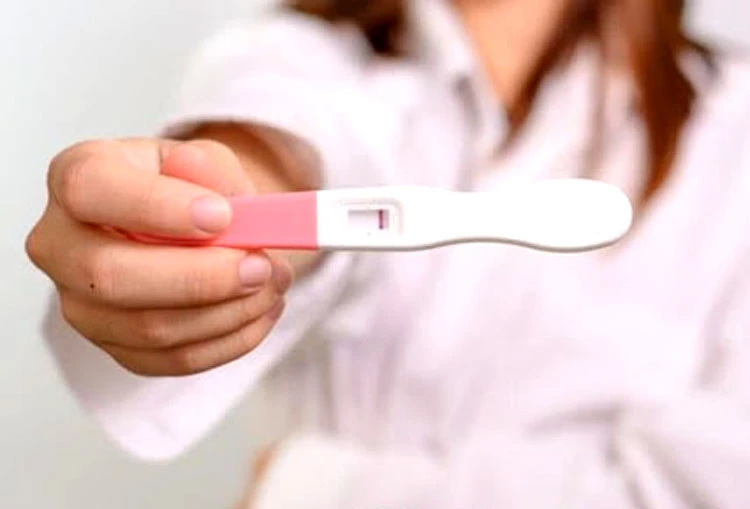

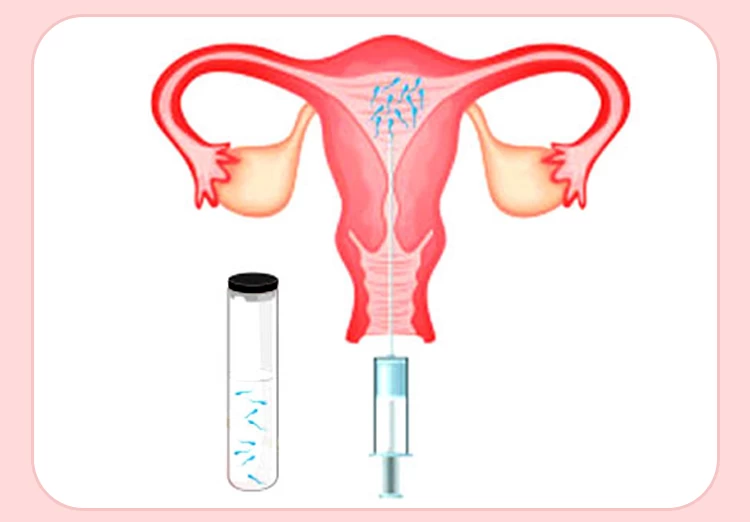
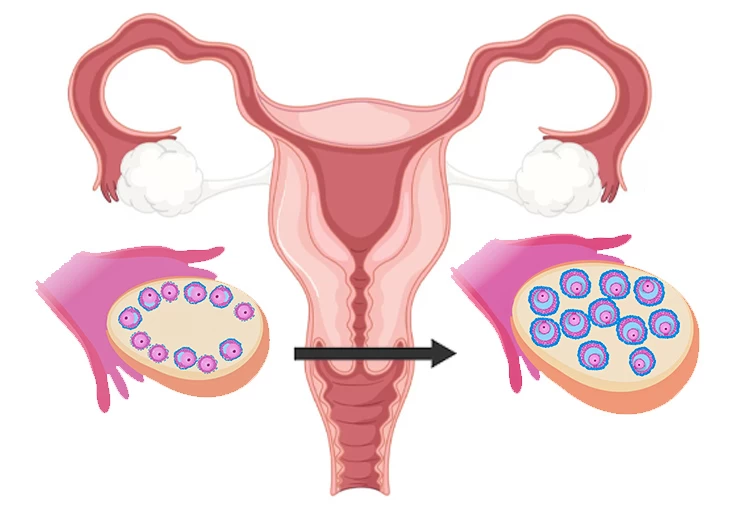

No reviews
Your comment